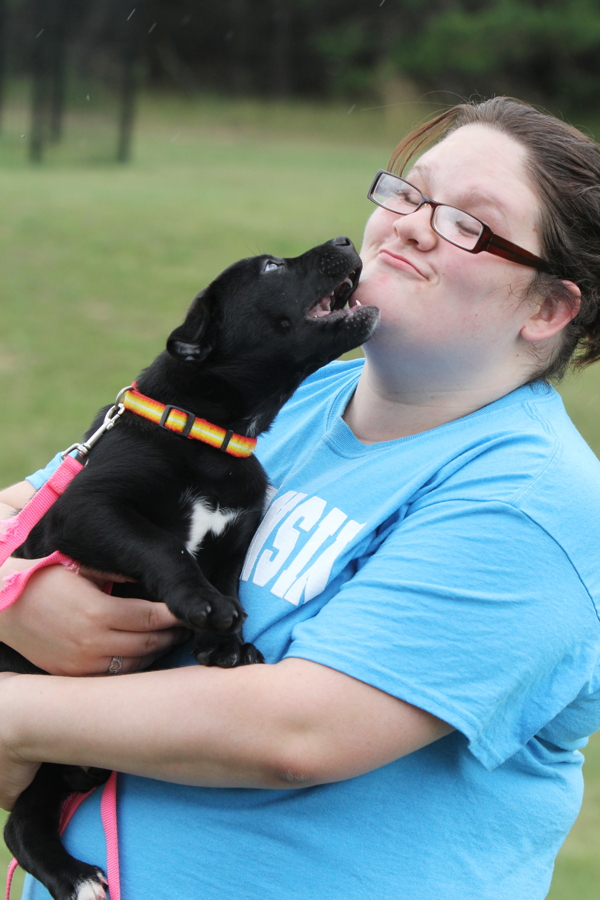Get Your Dog Tagged!
surprisingly few pet owners license their animals –and that’s a problem
Tom Giffey, photos by Andrea Paulseth

I’ll be the first to admit I’m a procrastinator, and paying for my pet licenses is no exception. I had months to send a check to the city of Eau Claire, but as usual I waited until just a few days before the March 31 deadline to schlep down to City Hall and hand over a check to keep my household’s ownership of one dog and two cats on the up-and-up for another year.
My procrastination would be unremarkable except for one thing: It led me to a revelation about the dismally low percentage of people around here who license their pets. And that drew me up onto my soapbox to make a plea for licensing your animals for their own good – and the good of the rest of their furry friends.
Before the guilt trip let’s take a detour to Mathville. Unlike most other communities, the city of Eau Claire requires that cats be licensed just like dogs. When I paid the modest sum of $13 each for my two neutered male cats, the nice lady at the city treasurer’s office handed me two small metal tags, numbered 709 and 710. Considering that the deadline was just a few days away, I figured these were two of the last cats that would be licensed in 2013. And that got me thinking: Could there really only be 700-some cats in a city the size of Eau Claire? Considering how gaga Americans are for their companion animals, that’s about as likely as Odie outwitting Garfield.
In fact, it appears that only the minority of dogs and cats in the city (and dogs in the county) have their tags. According to city records, 912 cats and 3,657 dogs were licensed in the city in 2012. How do I know this is out of whack? The Humane Society of the United States estimates there are 78.2 million dogs and 86.4 million cats nationwide. Breaking this down to a per-capita basis and applying it to the city of Eau Claire, that means there should be approximately 18,281 cats and 16,541 dogs in the city (assuming, of course, that our pet-ownership rate is approximately the same as the nation’s). To put it another way, only 22 percent of Eau Claire canines and a mere 5 percent of Eau Claire felines are street legal.
Meanwhile, 7,603 dogs were licensed last year in all of Eau Claire County. Based on the estimates about dog ownership made above, there should be about 24,867 dogs in the county – meaning only 31 percent of them are licensed. To be sure, that’s better than the city total, but it’s still well below half.
So what? It’s not as if owning an unlicensed dog is like driving without a license, or practicing medicine or law without one. That’s true, I suppose, but there are still a number of good reasons that you should pay up annually. First, it’s the law. ’Nuff said.
Second, a good chunk of the money you pay for a license ends up directly helping animals in need. Dog licenses are required by state law but are sold on the municipal level (i.e., by cities, villages, and towns) and the bulk of the money is filtered back to the county. (Got that?) After sending a small portion to the state and setting aside some to cover expenses and dog damage claims, the county sends the rest of the money – this year, that’s $42,765 – to the entity that is contracted to look after stray animals. Around here, that’s the Eau Claire County Humane Association. That figure may not sound like a lot, but it can provide a lot of kibble and clean a lot of kennels for homeless pets.
Eau Claire County humane officer Bekah Weitz wasn’t surprised when I told her about the low licensing rate I calculated. “While it is illegal to have an animal without a license, the penalty isn’t so great that it is something people think about,” she said. “It’s also something that’s not very well enforced.” As the sole humane officer in a county of about 100,000 people, Weitz has her hands full investigating cruelty and abuse claims and no time to check up on untagged dogs: “To be frank, I’m a lot more concerned with someone who’s not feeding (their dog) than someone who’s not licensing it.”
Be that as it may, licenses are still important. Sometimes stray dogs brought to the shelter are reconnected with their owners because they’re wearing their dog licenses, Weitz said. Paying the license fee – in the city of Eau Claire, it’s just $18 for an altered dog and $37 for an unaltered one – might just reconnect you with your beloved pet if he gets lost, and it will certainly help other critters in that predicament. “It’s the responsible thing to do,” Weitz said of licensing your pet.
“The money goes to a good cause, and you’re showing responsibility of the owner.”
For more information on getting your pet licensed, contact your city, village, or town hall or your local humane association. The Eau Claire County Humane Association can be reached at (715) 839-4747.

